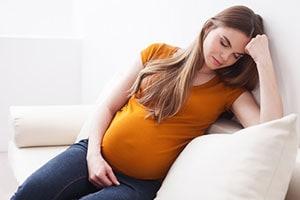Help Center
Online Resource Center for Information on Birth Injuries.

Postpartum depression can be a very hard topic to talk about for new mothers. It’s a subject that gets hidden away behind closed doors due to fear of stigma and feelings of shame. No mother wants to feel like a “bad mother” because they are struggling with their mental health after giving birth. People expect mothers to be overjoyed and excited to start their new life with a child, but it’s not always as easy as it looks.
Before we start getting into the details of postpartum depression, it’s important for every new mother to know this. Being depressed after having a baby does NOT mean you aren’t a good mother or that you’re not fit to raise a child. On top of that, there is absolutely no shame in getting help. In fact, we encourage you to reach out to a mental health specialist immediately if you feel yourself struggling. You should never feel like you have to go through this alone, there is help available. At the end of this article we’ll provide some resources that can help start your journey to feeling better. Now, let’s explore what postpartum depression is and how it can be treated.
You may have heard of the term “baby blues” that can happen after pregnancy. This is a common thing that mothers experience for the first 3 to 5 days after bringing their child home. Mothers can feel sad, lethargic, or irritable. Postpartum depression, however, is different from this condition. Postpartum depression occurs when these depressive feelings last longer than 2 weeks and can progress over time. Feeling hopeless or empty for an extended amount of time is not a normal part of early motherhood.
Since postpartum depression is often seen as a slightly taboo topic, a lot of mothers may not know how common it really is.
Some degree of postpartum depression is actually very common. An estimated 50-80% of mothers experience some type of “baby blues” in the first 2 weeks after birth. Another 10-20% of mothers will experience postpartum depression in the first year after birth. This shows how prevalent the illness really is. If we include women who have miscarried or had a stillbirth, it’s estimated that 900,000 women suffer from postpartum depression annually in the United States.
With postpartum depression clinical symptoms will last longer than 2 weeks and can worsen over time. It’s normal to feel generally overwhelmed after bringing a baby home, but it’s important to contact a doctor if you start experiencing these symptoms for a prolonged period of time. The most common symptoms of postpartum depression include:
It’s generally believed that sudden, drastic hormonal changes in the body are what trigger postpartum depression. During pregnancy, the levels of estrogen and progesterone in the mother’s body surge to very high levels. These hormones help with carrying and delivering the baby. Once the baby has been born, the hormone drop back down to pre-pregnancy levels. The drop in hormone levels happens very rapidly, usually within 24 hours after birth. This sudden change in hormones can lead to feelings of depression. Additionally, the thyroid is used during pregnancy to help regulate and store energy from food. Thyroid hormone levels also drop after giving birth, which can also possibly trigger depression.
There are also outside influences that can intensify feeling of sadness and depression after giving birth to a child. Some common complaints women have after giving birth include:
Postpartum psychosis is a rare condition that happens to some mothers with postpartum depression. It occurs in up to 4 mothers out of every 1,000 births. It usually appears within the first 2 weeks after childbirth and should be recognized as a medical emergency. Mothers with mood disorders, such as bipolar disorder, have a higher risk of contracting this condition. Some of the common symptoms for postpartum psychosis include:
There are a few different ways postpartum depression can be treated:
Treatments can either be used alone or together as a type of cocktail medication. Taking medication while going to therapy can be used an all-around treatment that addresses every aspect of your life. It’s important to note that taking psychiatric medicine does not make you a bad or incompetent mother. There is no shame in getting help for your illness, in fact, it’s a sign of strength and resilience.
Even if you’re seeing a doctor, it can be hard to find ways to manage your illness at home. Here are some tips that may help: